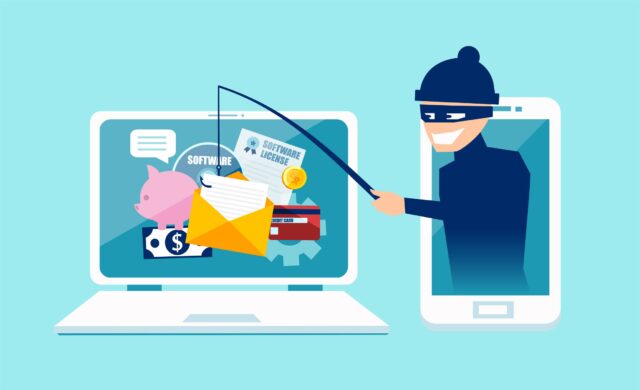
Every week we hear of another “bet gone wrong” story, usually involving an individual who found themselves on the sharp end of a scam. Regardless of what your level of gambling is, we hope you will read over our guide to make sure you don’t give scammers any chance to take advantage.
What are the common scams?

We’re going to discuss some common scams and how they work and also give you a list with some tips on how to keep yourself safe from those unscrupulous individuals who would like nothing better than for gullible punters to part with. Their hard-earned money! Safety starts here.
The different kinds of scams that you can come across online include but are not limited to:
1. Phishing
This is where someone poses as a website to steal personal details such as credit card details or whatever else they find out about you over email. You will usually be asked to fill out a form, which then tells the scammers what data you have given them. Do not give out any personal information unless you are certain that the website is genuine, i.e., you have done some checking first and know that it’s a legitimate betting website.
2. Malware

Malware is similar to phishing scams, but they work through email attachments and/or clicking on links within an email. The link might lead to another site or even download malware onto your computer. Clicking on an attachment can also download malware onto your computer or cause other havoc depending on what type of file it is and how it interacts with your computer’s software.
3. Social engineering
This is where you are tricked into revealing information about yourself, either by phone call, email, or social media. The scammers want to steal your details and passwords so that they can access your bank account and credit card. Sometimes it may also be a simple scam where someone gets your email address or mobile phone number and either invites you to a site where they intend to steal your personal data or starts conversations with you to pick up information about you.
4. Pharming
Pharming is where crooks use the details of legitimate websites to lure people in. Apparently, they will use a website that is similar to the real thing. However, once you enter your details, they will then use those to access your accounts and steal money.
5. Hijacking

Hijacking is where scammers break into computers to redirect web users to their malicious websites. This can happen if you accidentally click on a link that has been sent to you or because you have an old operating system or software which does not recognize the URL properly.
6. Fake betting sites
These are websites that have been set up by criminals to look exactly like an existing betting site so that punters will mistakenly believe they are using the proper site. They are often full of pop-ups and advertisements, which may contain misleading offers and induce you to bet money.
7. Email lures
This is similar to social engineering scams, except that they rely solely on email. They will trick you into revealing personal information via email as opposed to on the telephone or in person.
What should you look for in a legitimate site?

There are plenty of legitimate sites offering online sports betting and sports betting picks, which can be found at: https://www.thesportsgeek.com/picks/.
1. It should have a clear address. If it doesn’t, then you must question the validity of the website.
2. Check the website for spelling mistakes or other errors. If it looks like a hasty job, then there is every chance that it is not a genuine site.
3. Check if the website has an About Us page and Privacy Policy page, especially if you have entered your credit card details or personal information in some way. These pages should be easily located from their main pages and tell you exactly who runs the site as well as what they do with your information and how long they keep your data.
4. Check their credentials. You should be able to find information about a certain website by searching the internet. Some sites can post links to their social media pages as well as testimonials from clients, so you can have an idea of what kind of company you are dealing with. If there is nothing there, then this is probably not a legitimate site.
5. Safety and security settings – using only secure websites is always the best idea. When using a regular web browser, which includes Internet Explorer, Chrome, or Safari, use the private browsing option. This will ensure that you are not being monitored as you browse the internet and will hide any information about your personal details or passwords from view. You might even have to turn off your Internet connection to do this.
6. Make sure that you have updated your anti-virus software or other software on your computer so that you can check for fraudulent files and remove them automatically if they are found.
7. When you are entering your details into a betting website, check to see if you will be redirected to another website to place your bet. By doing this, the site could be recording your account information and using it as they wish. If they are, then do not use that site and report it to the proper authorities so that they can shut them down.
8. Online payments are not necessarily safe. Make sure that you use your credit card for making deposits, withdrawals, and other payments, as it is the most secure form of payment. However, do not leave your card details on the site when you place a bet or make a payment. Use companies such as PayPal, which will protect your personal details if there is an issue with the betting website later on.

It is very important to be cautious of any company that you are dealing with online. Should you have any doubts, then it is best to contact the proper authorities before you spend any money, as they will be able to advise you regarding the legitimacy of the website and what kind of data it has on file.
There is no doubt that gambling and betting can be fun and exciting, but there are also those who will seek ways of scamming people out of their money. The best thing to do if you get caught up in something like this is simply not to hand over any details until you have checked with the proper authorities and been given a licence number or other proof that they are genuine.









